人教版八年级下册英语unit 3 语法+知识点ppt课件
人教版八年级英语下unit3重点短语及句型总汇+配套练习(附语法)
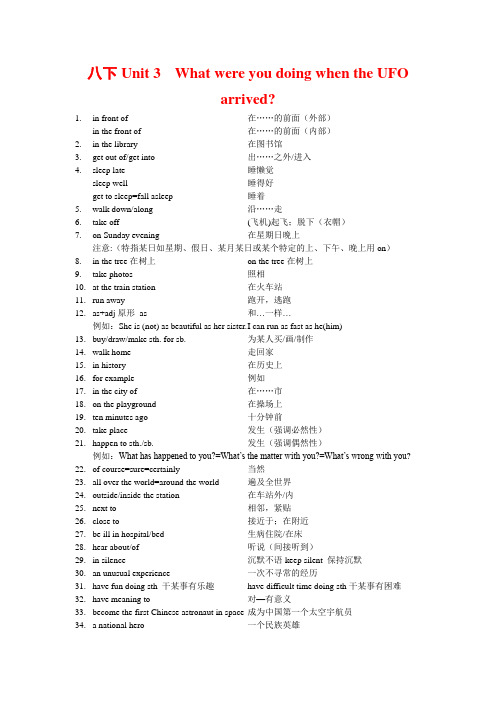
八下Unit 3 What were you doing when the UFOarrived?1.in front of 在……的前面(外部)in the front of 在……的前面(内部)2.in the library 在图书馆3.get out of/get into 出……之外/进入4.sleep late 睡懒觉sleep well 睡得好get to sleep=fall asleep 睡着5.walk down/along 沿……走6.take off (飞机)起飞;脱下(衣帽)7.on Sunday evening 在星期日晚上注意:(特指某日如星期、假日、某月某日或某个特定的上、下午、晚上用on)8.in the tree在树上on the tree在树上9.take photos 照相10.at the train station 在火车站11.run away 跑开,逃跑12.as+adj原形as 和…一样…例如:She is (not) as beautiful as her sister. I can run as fast as he(him)13.buy/draw/make sth. for sb. 为某人买/画/制作14.walk home 走回家15.in history 在历史上16.for example 例如17.in the city of 在……市18.on the playground 在操场上19.ten minutes ago 十分钟前20.take place 发生(强调必然性)21.happen to sth./sb. 发生(强调偶然性)例如:What has happened to you?=What’s the matter with you?=What’s wrong with you?22.of course=sure=certainly 当然23.all over the world=around the world 遍及全世界24.outside/inside the station 在车站外/内25.next to 相邻,紧贴26.close to 接近于;在附近27.be ill in hospital/bed 生病住院/在床28.hear about/of 听说(间接听到)29.in silence 沉默不语 keep silent 保持沉默30.an unusual experience 一次不寻常的经历31.have fun doing sth 干某事有乐趣have difficult time doing sth干某事有困难32.have meaning to 对—有意义33.become the first Chinese astronaut in space 成为中国第一个太空宇航员34. a national hero 一个民族英雄35.35. be famous all over the world 全世界出名36. for the first time 第一次本单元目标句型:What were you doing when I arrived/at that time/at 8:00 last night/from 9:00 to 10:00 yesterday?1.I was doing sth. When+一般过去时的时间状语从句...2.How about... / What about...?3.While sth./sb. was doing sth., I was doing sth....4.当不明飞行物着陆时,你正在干啥?What were you doing when the UFOlanded?5.当妈妈正在做饭时,我在看电视。
Unit3 复习课件人教版八年级英语下册

22.依赖
depend on
23.做家务
do chores
24.把某物借给某人 lend sb. sth.= lend sth. to sb.
25.讨厌做某事
hate to do/ doing sth
26.散步 27.照顾
take a walk care for=look after=take care of
8.在外面待到很晚 stay out late
9.搭车 10.从事
get a ride work on
11.帮助解决
help out with sth.
12.闲逛
hang out
13.至少
at least
14.扔下
throw down
15.过来
come over
16.频繁,反复 all the time
拓展:其他表示委婉请求的常用句型
Would you like (to do) sth.? May I do sth.?/ Shall we do sth.? Would you mind (doing) sth.? What/ How about (doing) sth.?
1. -__C_____ you please help me find my key? -No problem.
C.It's a shame
D.I&hink two hours of TV is enough for you! *two hours of: 在从句中做主语,谓语动词用单数形式。
*当时间、长度、距离或其他可数名词表示 一个完整概念做主语,谓语动词用单数
委婉地请求别人许可: Could I do sth.? 肯定答语:Yes, you can./Sure./I guess so./Certainly / Sure, that should be OK. /Of course. 否定答语: Sorry, you can’t./ I’m afraid you can’t. (并说明理由)
人教版英语八年级下册 Unit3 Could you please clean your room教
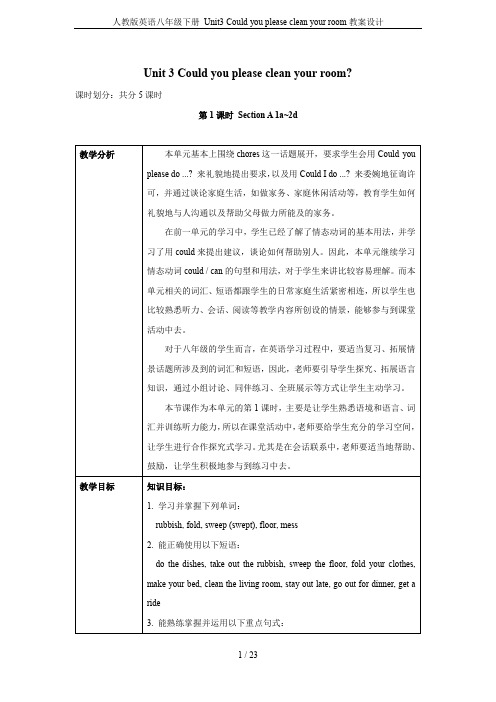
A: Could you please sweep the floor?
B: Yes, sure. Can you do the dishes?
A: Well, could you please do them? I’m going to clean the living room.
Peter
do the dishes
M
sweep the floor
M
take out the trash
P
make the bed
P
fold the clothes
P
clean the
living room
M
2. Make conversations about the chores in 1a.
7) Could you take out the rubbish, fold the clothes and do the dishes?
8) Could I at least finish watching this show?
能力目标:
通过听说训练,学会能够礼貌地提出要求或征询许可,并礼貌地回复别人的请求与征求。
Peter wantsto...
Peter’s fathersays
go out fordinner
√yes _____no
go to themovies
√yes _____no
stay outlate
_____ yes√no
get aride
_____ yes√no
Check answers.
人教版英语八年级下册Unit3语法透视:情态动词could的用法
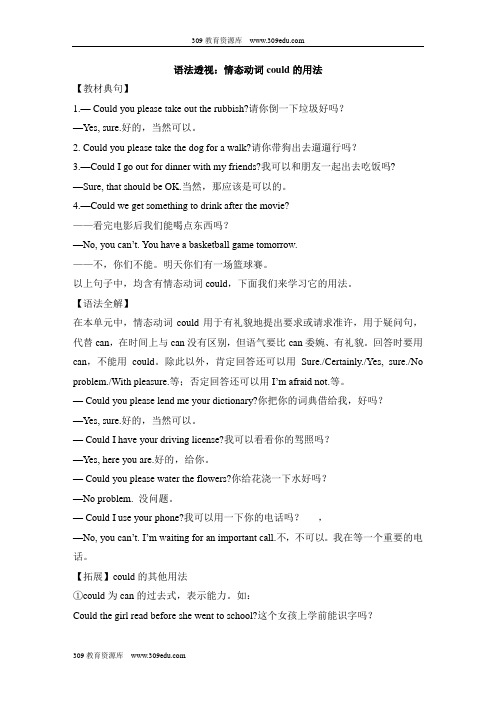
语法透视:情态动词could的用法【教材典句】1.— Could you please take out the rubbish?请你倒一下垃圾好吗?—Yes, sure.好的,当然可以。
2. Could you please take the dog for a walk?请你带狗出去遛遛行吗?3.—Could I go out for dinner with my friends?我可以和朋友一起出去吃饭吗? —Sure, that should be OK.当然,那应该是可以的。
4.—Could we get something to drink after the movie?——看完电影后我们能喝点东西吗?—No, you can’t. You have a basketball game tomorrow.——不,你们不能。
明天你们有一场篮球赛。
以上句子中,均含有情态动词could,下面我们来学习它的用法。
【语法全解】在本单元中,情态动词could用于有礼貌地提出要求或请求准许,用于疑问句,代替can,在时间上与can没有区别,但语气要比can委婉、有礼貌。
回答时要用can,不能用could。
除此以外,肯定回答还可以用Sure./Certainly./Yes, sure./No problem./With pleasure.等;否定回答还可以用I’m afraid not.等。
— Could you please lend me your dictionary?你把你的词典借给我,好吗?—Yes, sure.好的,当然可以。
— Could I have your driving license?我可以看看你的驾照吗?—Yes, here you are.好的,给你。
— Could you please water the flowers?你给花浇一下水好吗?—No problem. 没问题。
Unit-3-单元模块复习课件(含重点单词短语句型-语法-高频考点-对接中考)人教版英语八年级下册

15
3高频考点串联
一、词汇运用
6.— I didn't go to the park yesterday.
—________ did I. I went to the movies with my cousin.
二核心短语与句型55单元主题作文单元主题作文26cleanroomdodishescookingtakeoutrubbishsweepfloorfoldyourclothesmakeyourbeddoshoppingfixmachines打扫房间洗餐具做饭倒垃圾拖地板叠衣服整理床铺购物修理机器二核心短语与句型55单元主题作文单元主题作文27cleanroomdodishescookingtakeoutrubbishsweepfloorfoldyourclothesmakeyourbeddoshoppingfixmachines打扫房间洗餐具做饭倒垃圾拖地板叠衣服整理床铺购物修理机器二核心短语与句型55单元主题作文单元主题作文28couldyoupleasesweepfloor
Review
单元学习目标
4.能根据本单元
2.学会用could提 出要求或征求别 人的许可,并作
3. 能 用 英 语 表达 一些日常家务活。
的所学知识和本 单元的话题,写 出一篇短文表述 自己对于做家务 的观点。
1.会读写并运用 出应答。
本单元重点词汇
和句型。
课件功能说明:
1.课时不够的情况下,课本听力+该课件,助力自由完成单元教学目
4
1单元基础读背
人教版英语八年级下册Unit3《Couldyoupleasecleanyourroom》说课稿
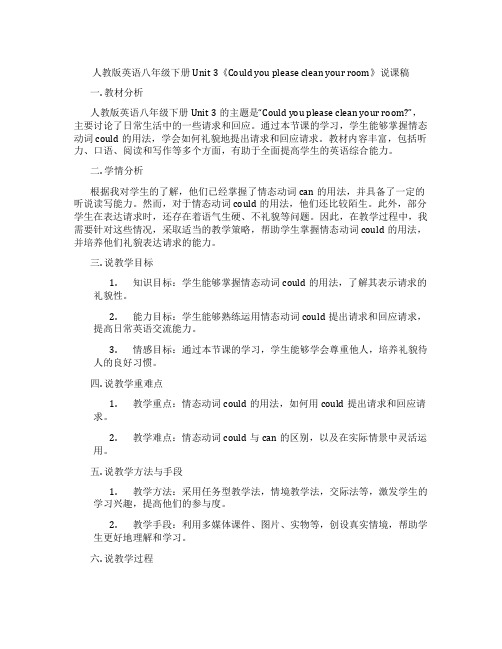
人教版英语八年级下册Unit 3《Could you please clean your room》说课稿一. 教材分析人教版英语八年级下册Unit 3的主题是“Could you please clean your room?”,主要讨论了日常生活中的一些请求和回应。
通过本节课的学习,学生能够掌握情态动词could的用法,学会如何礼貌地提出请求和回应请求。
教材内容丰富,包括听力、口语、阅读和写作等多个方面,有助于全面提高学生的英语综合能力。
二. 学情分析根据我对学生的了解,他们已经掌握了情态动词can的用法,并具备了一定的听说读写能力。
然而,对于情态动词could的用法,他们还比较陌生。
此外,部分学生在表达请求时,还存在着语气生硬、不礼貌等问题。
因此,在教学过程中,我需要针对这些情况,采取适当的教学策略,帮助学生掌握情态动词could的用法,并培养他们礼貌表达请求的能力。
三. 说教学目标1.知识目标:学生能够掌握情态动词could的用法,了解其表示请求的礼貌性。
2.能力目标:学生能够熟练运用情态动词could提出请求和回应请求,提高日常英语交流能力。
3.情感目标:通过本节课的学习,学生能够学会尊重他人,培养礼貌待人的良好习惯。
四. 说教学重难点1.教学重点:情态动词could的用法,如何用could提出请求和回应请求。
2.教学难点:情态动词could与can的区别,以及在实际情景中灵活运用。
五. 说教学方法与手段1.教学方法:采用任务型教学法,情境教学法,交际法等,激发学生的学习兴趣,提高他们的参与度。
2.教学手段:利用多媒体课件、图片、实物等,创设真实情境,帮助学生更好地理解和学习。
六. 说教学过程1.导入:通过播放一段关于孩子们日常生活的视频,引出本节课的主题“Could you please clean your room?”。
2.新课呈现:介绍情态动词could的用法,并通过例句展示如何用could提出请求和回应请求。
八下unit3 SectionA 2a-2d -八年级下册英语同步精美课件(人教版)

3. I tried to
the driving test, but I failed.
— That’s a pity. Good luck to you.
A. past
B. passed C. pass
Homework
1. List all the phrases of doing chores that you know. 2. Make a conversation between you and your mother, using the sentence pattern “Could you please …?”.
Peter wants to… go out for dinner. go to the movies. stay out late. get a ride.
Peter’s father says…
√ Yes
No
√ Yes
No
Yes
√ No
Yes
√ No
2b Listen again. Why does Peter’s father say “no”? Draw lines to the reasons.
单项选择。
1. —Jeff, could you tell me how to order a taxi
online?
—
.
A. You’re welcome B. Sure C. Take it easy
2. Please
the rubbish.
A. take out B. take it out C. takes out
Dad: No, you can’t. You have a basketball game tomorrow, remember? You need to have a good rest . Peter: Oh, yeah. Well, could you give me a ride to town now? If I take the bus, I’ll be late . Dad: I can’t, Peter. I have to do some work now. Peter: Oh, OK. No problem. I’ll call Alan.
(完整版)人教版八年级英语下册Unit3Couldyoupleasecleanyourroom重点词
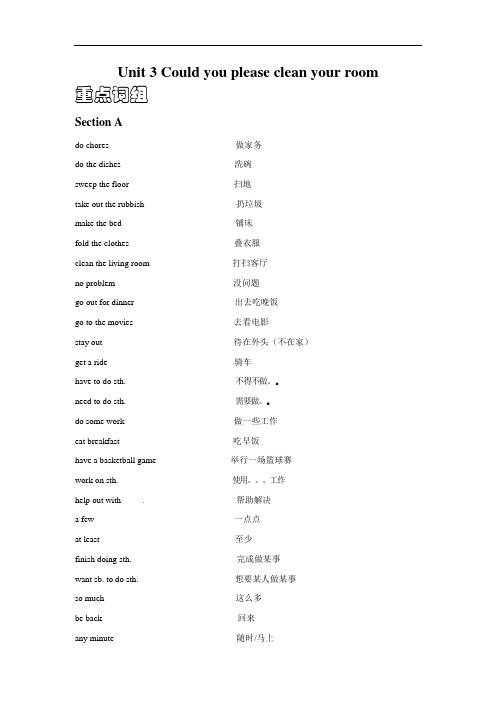
Unit 3 Could you please clean your room 重点词组Section Ado chores 做家务do the dishes 洗碗sweep the floor 扫地take out the rubbish 扔垃圾make the bed 铺床fold the clothes 叠衣服clean the living room 打扫客厅no problem 没问题go out for dinner 出去吃晚饭go to the movies 去看电影stay out 待在外头(不在家)get a ride 骑车have to do sth. 不得不做。
need to do sth. 需要做。
do some work 做一些工作eat breakfast 吃早饭have a basketball game 举行一场篮球赛work on sth. 使用。
工作help out with 帮助解决a few 一点点at least 至少finish doing sth. 完成做某事want sb. to do sth. 想要某人做某事so much 这么多be back 回来any minute 随时/马上clean and tidy 干净整洁be angry with 对某人生气solve the problem 解决问题throw down 扔下in front of 在。
前面come over 过来take...for a walk 带。
去散步all the time 一直all day 整个白天do housework 做家务all evening 整个夜晚shout back 吼叫还击walk away 走开come home from work 下班回家in surprise 惊讶地share the housework 分担家务sit down 坐下hang out 出去玩help sb. (to) do sth. 帮助某人做某事how much 多少come back 回来try (not) to do sth. 努力(不)做某事hate to do sth. 讨厌做某事Section Bask sb. to do sth. 让某人做某事next to 靠近have a party 参加派对have a test 参加考试mean doing sth. 意味着。
- 1、下载文档前请自行甄别文档内容的完整性,平台不提供额外的编辑、内容补充、找答案等附加服务。
- 2、"仅部分预览"的文档,不可在线预览部分如存在完整性等问题,可反馈申请退款(可完整预览的文档不适用该条件!)。
- 3、如文档侵犯您的权益,请联系客服反馈,我们会尽快为您处理(人工客服工作时间:9:00-18:30)。
1、过去进行时表示过去某一段时间或某一时刻正 在 进行的动作。
What were you doing at 7p.m. yesterday? 昨天晚上七点你在干什么?
I first met Mary three years ago. She was working at a radio shop at the time. 我第一 次遇到玛丽是在三年前,当时她在一家无线电商店 工作。
I was doing my homework at this time yesterday. 昨天的这个时候我正在做作业。
They were waiting for you yesterday. 他们昨天一直在等你。
.
过去进行时的构成:
肯定形式:主语+was/were+V-ing 否定形式:主语+was not (wasn‘t)/were
I was cooking when she knocked at the door. 她敲门时我正在做饭。
.
2. when后通常用表示短暂性动词,while后通常用表示持 续性动词,因此它所引导的状语从句中,谓语动词常用进 行时态,
When the car exploded I was walking past it. = While I was walking past the car it exploded.
not (weren’t)+V-ing 疑问形式:Was/Were+主语+V-ing
.
1、过去进行时表示过去某一段时间或某一时刻正 在进行的动作。
常与之连用的时间状语有,at that time/moment, (at) this time yesterday (last night/Sunday/week…), at+点钟 +yesterday (last night / Sunday…), when sb. did sth等时间状语从句,
.
be amazing与be amazed
be amazing 令人惊奇的(修饰事物的,指某事令人 惊奇,比surprising更具意外性
eg. She has an amazing talent for music.她 在音乐方面有惊人的才华。 Isn’t that amazing .那不很令人意外吗?
be amazed (at sth./to do …/that 从句)(某人) 对…(因…而)大感惊讶(指人作主语)
eg. We were amazed at the news.
=We were amazed to hear the news. 我们对这个消息感到非常惊讶.
.
in a tree与 on a tree
in(at) the front of 在……的前头,前排(列) (在一个范围内的前面部位) eg. She sat in the front of the bus. 她坐 在公交车的前排
.
get out of 与get into 是反义词
get into走进,进入 eg. He get out of the car and gБайду номын сангаасt into the building
Unit 3
What were you doing when the UFO arrived?
.
in front of 与in (at) the front of
in front of 在……的前面 (表示“有距离的前 面”,在一个参照物的前面) eg. There is a car in front of the house. 房子前面有一辆车
in a tree eg. Are there any birds in the tree? 树上有些鸟吗?
on a tree 在树上(指长在树上的东西) eg. Look! There are many apples on the tree.
.
Grammar
—————过去进行时
.
过去进行时表示过去某一时刻或者某段时间正在进行或发 生的动作,常和表过去的时间状语连用,如:
I was taking a walk when I met him. 我正在散步,突然遇见了他。
We were playing outside when it began to rain. 我们正在外边玩,这时下 起雨来了。
.
感谢亲观看此幻灯片,此课件部分内容来源于网络, 如有侵权请及时联系我们删除,谢谢配合!
.
3.when用作并列连词时,主句常用进行时态,从句则用一 般过去时,表示主句动作发生的过程中,另一个意想不到 的动作发生了。
I was walking in the street when someone called me. 我正在街上走时突然有人喊我。
.
4. when作并列连词,表示“(这时)突然”之意时,第一 个并列分句用过去进行时,when引导的并列分句用一般过 去时。
